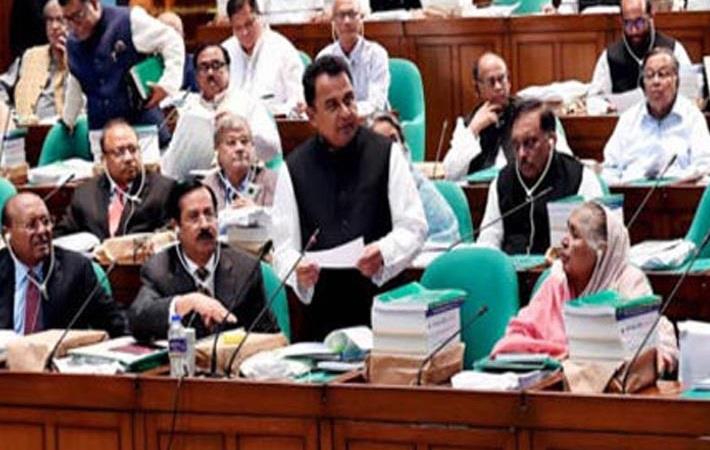Interviews
Bangladesh creating database with 27000 RMG units' details
14 Jun '19
3 min read

Bangladesh finance minister AHM Mustafa Kamal presenting the Budget 2019-20 in Jatiya Sangsad. Pic: bangalinews
After creating a database of information on 4,808 readymade garment (RMG) factories, Bangladesh is now working on a database containing details of 27,000 such units, finance minister AHM Mustafa Kamal announced in his 2019-20 budget speech. To boost female employment, 4,706 day-care centres have been set up in different factories till February 2019, he said.
The centres will be supervised by the Department of Inspection for Factories and Establishments, he said.
Four RMG sub-sectors are receiving export incentives now at 4 per cent. Kamal proposed to offer one per cent export incentive in the next fiscal to the rest of the RMG sub-sectors. An additional allocation of Tk 2,825 crore will be made in the budget for this purpose.
The RMG tax rate is 12 per cent and 10 per cent if there is green building certification. For textile sector, the tax rate is 15 per cent. These sectors are enjoying reduced tax rates for long and this advantage will expire on June 30.
Considering the contribution of these sectors to the country’s economy, particularly in boosting exports and generating employment, the finance minister proposed to continue this provision of reduced rate of taxes for these sectors.
A complete inspection checklist based on labour laws in the country has been formulated, which will enable labour inspectors to ensure compliance while inspecting factories and establishments. Compliance of 8,261 factories and establishments has been ensured from fiscal 2015-16 to February 2019, he said.
To promote a worker-friendly atmosphere in mills and factories, a piece of legislation called Bangladesh Labour Act (Amendment), 2018, was enacted in line with standards of International Labour Organisation (ILO).
In addition, the government promulgated the EPZ Labour Ordinance 2019, which introduced provisions for the recruitment of workers in industries, owner-worker relationships, determination of the minimum wage rate, payment of wages, compensation for injuries to workers due to accidents during working hours, introduction of provisions on health, safety, etc. of workers, formation of workers’ welfare associations, and formation of the EPZ Workers’ Welfare Association the minister noted.
In December 2018 of the current fiscal, minimum wages were fixed in eight industrial sectors including readymade garments. The ‘Bangladesh Labour Welfare Foundation Fund’, formed to ensure the welfare of workers employed in both formal and non-formal sectors, have provided assistance amounting to Tk 28.05 crore to a total of 6,052 workers from fiscal 2012-13 till now, he said.
A sum of Tk 57.05 crore has been provided to 2,981 workers employed in 100-percent export oriented garment industries from the aforementioned fund from fiscal 2016-17 till now. (DS)
The centres will be supervised by the Department of Inspection for Factories and Establishments, he said.
Four RMG sub-sectors are receiving export incentives now at 4 per cent. Kamal proposed to offer one per cent export incentive in the next fiscal to the rest of the RMG sub-sectors. An additional allocation of Tk 2,825 crore will be made in the budget for this purpose.
The RMG tax rate is 12 per cent and 10 per cent if there is green building certification. For textile sector, the tax rate is 15 per cent. These sectors are enjoying reduced tax rates for long and this advantage will expire on June 30.
Considering the contribution of these sectors to the country’s economy, particularly in boosting exports and generating employment, the finance minister proposed to continue this provision of reduced rate of taxes for these sectors.
A complete inspection checklist based on labour laws in the country has been formulated, which will enable labour inspectors to ensure compliance while inspecting factories and establishments. Compliance of 8,261 factories and establishments has been ensured from fiscal 2015-16 to February 2019, he said.
To promote a worker-friendly atmosphere in mills and factories, a piece of legislation called Bangladesh Labour Act (Amendment), 2018, was enacted in line with standards of International Labour Organisation (ILO).
In addition, the government promulgated the EPZ Labour Ordinance 2019, which introduced provisions for the recruitment of workers in industries, owner-worker relationships, determination of the minimum wage rate, payment of wages, compensation for injuries to workers due to accidents during working hours, introduction of provisions on health, safety, etc. of workers, formation of workers’ welfare associations, and formation of the EPZ Workers’ Welfare Association the minister noted.
In December 2018 of the current fiscal, minimum wages were fixed in eight industrial sectors including readymade garments. The ‘Bangladesh Labour Welfare Foundation Fund’, formed to ensure the welfare of workers employed in both formal and non-formal sectors, have provided assistance amounting to Tk 28.05 crore to a total of 6,052 workers from fiscal 2012-13 till now, he said.
A sum of Tk 57.05 crore has been provided to 2,981 workers employed in 100-percent export oriented garment industries from the aforementioned fund from fiscal 2016-17 till now. (DS)
Fibre2Fashion News Desk – India
Popular News
Leave your Comments
Editor’s Pick
Pratik Gadia
The Yarn Bazaar - Filosha Infotech Private Limited
Ritesh Dodhia
Dodhia Synthetics Limited
Andreas Rass
ZIMMER AUSTRIA | Digital Printing Systems
































-Ltd..jpg?tr=w-120,h-60,c-at_max,cm-pad_resize,bg-ffffff)





.jpg?tr=w-120,h-60,c-at_max,cm-pad_resize,bg-ffffff)
.jpg?tr=w-120,h-60,c-at_max,cm-pad_resize,bg-ffffff)






